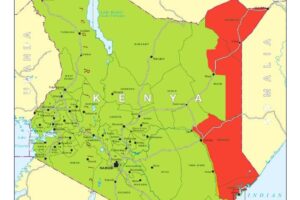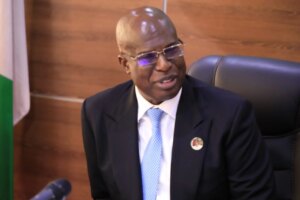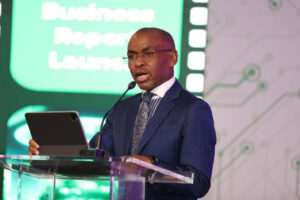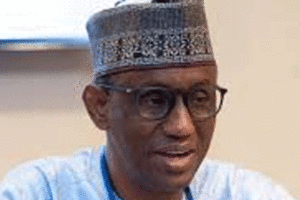
Rhoda Adeola remembers the first time she earned in euros: €500 as a contract hire for a Dutch company from her home in Nigeria in 2021.
“I remember paying my [church offerings] in dollars even when I was earning in naira,” she said. “I’d take ₦10,000, exchange it for a few dollars, and give that instead. I used to tell myself, one day I’ll earn in this currency. I’ve always been that ambitious and hungry.”
Though she had no background in software, she was fascinated by the people behind it: the coders, the designers, and tech builders. Her job was to find them, match them to opportunities across Europe, and convince them to take a chance on something new.
She didn’t know it then, but that moment marked the beginning of a career that would stretch across time zones and continents, redefining what “work” could mean for an ambitious woman from Ibadan, southwest Nigeria.
Get the best African tech newsletters in your inbox
The unlikely route into tech
Adeola studied physics at the University of Ibadan. She enjoyed the discipline of science, but she found greater purpose in helping people navigate their careers. Through volunteering and employability programmes, she learned to coach others on putting together their resumes and interviewing. This instinct guided her toward HR.
“I realised I liked helping people figure out their next step,” she said.
After graduation, she joined an HR firm in Lagos. When the pandemic arrived, she worked from home, observing how the tech industry adapted quickly to remote systems. It influenced her next ambition to be part of the tech industry, where she saw the gap she could bridge between companies, talent, multi-market expansions, and tech.
On LinkedIn, she found a Nigerian recruiter at Microsoft who mentored Africans interested in tech recruiting. Adeola volunteered to help coordinate the sessions and learned how to screen software engineers, assess CVs, and manage candidate pipelines.
This experience led her to join the Dutch company, Matchr, which was expanding a new agency and looking for talent in Nigeria. Adeola applied and got hired, earning her first euro while in Nigeria.
Then came the layoffs
By 2022, Adeola had saved enough money to relocate to the UK for postgraduate studies—a master’s in HR —while still working remotely for the Dutch firm. Then came 2023 and the great tech layoffs. Meta, Amazon, and Miro—the whiteboarding platform and one of her key clients at Matchr—began cutting staff. The demand for tech recruiters dropped almost overnight. Her contract with the recruitment firm ended when tech hiring slowed.
“It was a difficult period,” she said. “But it pushed me to think about how to stay relevant.”
She realised that recruiting was evolving. Companies wanted professionals who could combine traditional hiring skills with data and strategy—people who understood markets as well as people. Adeola started learning how to use analytics tools that track salaries, hiring trends, and regional talent gaps. She became more involved in workforce planning and began advising managers on long-term recruitment strategies.
Recruiting had moved beyond filling roles. It had become about forecasting demand and filling talent pipelines before vacancies opened. Recruiting in technology demands both structure and empathy.
Describing her work process to me, Adeola said she begins her day analysing job briefs from hiring managers, mapping skills, and researching talent pools across countries. Then she reaches out, writing messages, scheduling calls, and connecting with candidates through referrals and online communities.
“You’re matching skill to environment,” said Adeola. “A great candidate succeeds when their ambition fits the company’s rhythm. You learn to listen differently about what people want from their next role, and whether the company can give them that.”
The new direction led her to her current position at a workplace safety software company, where she manages recruitment across the UK, US, Australia, and Asia-Pacific. Her role includes designing processes, ensuring compliance with different labour laws, and balancing local expectations with global standards.
“In developed countries, companies take workplace safety very seriously,” she explained. “They have health and safety or EHS [Environmental, Health, and Safety] managers who use ‘tech for good’ platforms to report incidents, track them, and produce compliance reports.”
Get the best African tech newsletters in your inbox
Reading the global market
Adeola’s perspective offers a window into the realities of global hiring. She understands how companies think and why they hesitate to hire from emerging markets.
“Many international companies still hesitate to hire from Africa even when the skills are there,” she said. “They think it’s complex. The legal and tax systems seem unclear, and some don’t understand how flexible African professionals already are.”
She believes Africa’s reputation is improving as more professionals work globally and deliver consistent results.
“India built a global reputation through decades of visibility,” said Adeola. “Africa is building its own story now.”
Her job often includes helping clients see beyond stereotypes. She explains how to manage payroll and compliance through global platforms, which makes hiring from anywhere far easier. She has also learned to act as a bridge, explaining cultural nuances, expectations, and communication styles between teams.
“Recruiting globally means understanding priorities,” said Adeola. “A developer in Berlin values balance. A designer in Nairobi values growth. A data engineer in San Francisco values ownership.”
Based in the UK, Adeola keeps the balance of someone whose work spans continents but whose life stays grounded in one place. She understands the freedom that comes with remote work, yet she values the calm that stability brings. She could trade her mornings in the UK for the sun in Bali, but she says she isn’t drawn to that kind of movement.
“I like the stability of where I am,” she said. “But if I wanted to move tomorrow, to Germany or the Netherlands, I could. My work allows that.”





